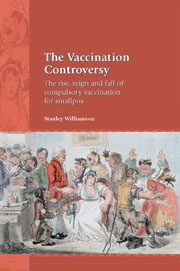15 - A Cruel and Degrading Imposture
from Part II - The Reign of Compulsion
Summary
Among the most prominent opponents of vaccination were two members of the medical profession, one more eminent than the other. Edgar Crookshank, Professor of Comparative Pathology and Bacteriology and Fellow of King's College, London, wrote a History and Pathology of Vaccination in two volumes (1889). The Preface to the first volume described how, following some investigations into an outbreak of cowpox, he became convinced that
the commonly accepted descriptions of the nature and origins of Cow Pox were purely theoretical […] I gradually became so deeply impressed with the small amount of knowledge possessed by practitioners concerning Cow Pox, and other sources of Vaccine Lymph, and with the conflicting teachings and opinions of leading authorities, in both the medical and veterinary professions, that I determined to investigate the subject for myself.
The essence of Crookshank's argument against vaccination was that the power of conferring immunity to smallpox, claimed for cowpox by disciples of Jenner, was a fallacy because what was injected under the guise of cowpox was in fact smallpox. The origins of this controversy lay in the earliest period when, with supplies of cowpox very scarce for lack of suitable outbreaks to draw on, some confusion had occurred over a consignment of alleged cowpox despatched by Jenner from London to a colleague in the country.
- Type
- Chapter
- Information
- The Vaccination ControversyThe Rise, Reign and Fall of Compulsory Vaccination for Smallpox, pp. 188 - 201Publisher: Liverpool University PressPrint publication year: 2007



